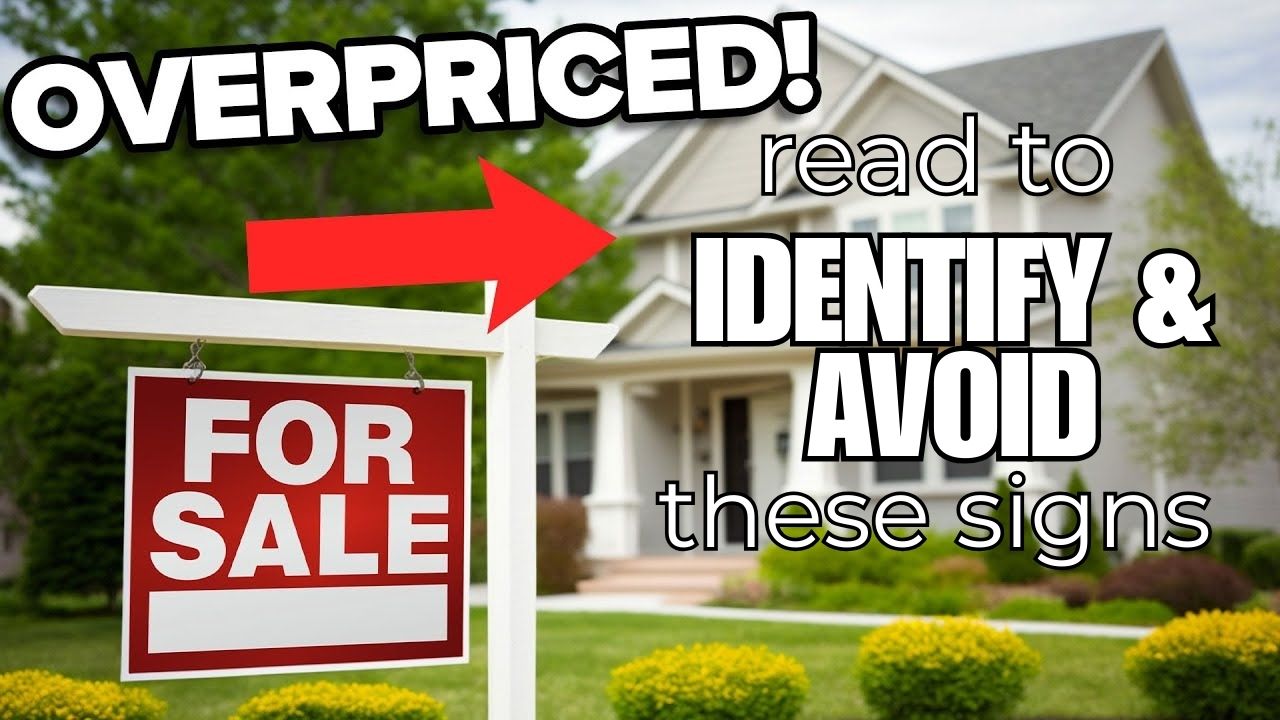
07 Nov How to Identify and Avoid Overpriced Homes
How to Identify and Avoid Overpriced Homes
In any real estate market, overpriced homes can stall your home-buying process, potentially lead to poor investment returns, or even cause financial strain. Identifying these properties and understanding why some homes are priced beyond their actual worth is essential to making a smart purchase. This guide explores the signs of an overpriced home, strategies to avoid overpaying, and insights into negotiation to help you avoid costly mistakes.
1. Understanding What Makes a Home Overpriced
An overpriced home is a property listed at a price higher than what it’s worth based on factors such as its location, condition, and market trends. These homes typically stay on the market longer and often undergo price reductions before they finally sell. There are many reasons a property might be overpriced, including:
- Seller Sentiment: A seller’s emotional attachment or personal valuation of the home may lead them to overestimate its market value.
- Outdated Comparables: Pricing based on old or irrelevant comparable sales may not accurately reflect current market conditions.
- Unrealistic Upgrades Value: Sellers may overvalue upgrades or renovations, expecting to recoup more than they realistically should.
- High Expectations in a Hot Market: In competitive markets, sellers may feel justified in asking for a premium, even if it doesn’t align with the actual value.
Knowing why a home may be overpriced can provide context and help you approach it with an informed perspective.
2. Spotting the Red Flags of an Overpriced Home
Identifying an overpriced property early on can save you time, effort, and money. Here are some red flags to watch for:
a) Long Days on Market (DOM)
Properties sitting on the market for much longer than average can be a major indicator of overpricing. While a few weeks on the market might be typical, homes that sit for months often signal either a pricing issue or other undesirable aspects of the property.
- Tip: Compare the DOM for this property against other homes in the area. If the average home sells in 30 days and this one has been listed for 90, it may be overpriced.
b) Price Reductions
Repeated or significant price reductions often indicate that a home started off priced too high. A pattern of price cuts can reveal that the seller has been testing the market but hasn’t found buyers willing to pay their initial asking price.
- Tip: If you see multiple price reductions, it’s worth asking your real estate agent to investigate the property’s pricing history and to find out why the seller has struggled to sell.
c) Priced Above Comparable Homes
One of the most effective ways to identify an overpriced home is to compare it to similar properties, or “comps,” in the same area. Comps should match the subject property’s size, location, condition, and age as closely as possible.
- Tip: Ask your real estate agent for a Comparative Market Analysis (CMA) to see how the property stacks up against others. If the asking price is noticeably higher without any compelling reason, it may be overpriced.
d) Outdated or Low-Quality Finishes
If a home has outdated finishes, but the price suggests otherwise, it’s likely overvalued. Homes that don’t offer features consistent with current market trends often don’t justify a premium price.
- Tip: During showings, take note of finishes like countertops, cabinets, flooring, and appliances. If these appear outdated or poorly maintained, and yet the price remains high, this could signal overpricing.
e) Surrounding Market Conditions
A soft market with slow sales and high inventory typically means lower prices, so a high listing price in such a market may signal unrealistic expectations.
- Tip: Check the market’s health by observing recent sales, current inventory levels, and trends. In a buyer’s market, there’s typically less demand, so overpriced homes will stand out.
3. Steps to Avoid Overpaying for an Overpriced Home
Once you’ve spotted an overpriced home, there are ways to avoid overpaying and, potentially, negotiate for a fairer price. Here’s how:
a) Work with a Knowledgeable Real Estate Agent
A seasoned real estate agent who knows the local market well can be your best asset in identifying fair prices and negotiating with sellers. Agents have access to data and insights that can help you evaluate whether a home is overpriced and what a reasonable offer might be.
- Tip: Choose an agent who has experience in your target area, as they’ll know the typical price range and be able to provide solid advice on pricing.
b) Rely on a Comparative Market Analysis (CMA)
A CMA is essential for understanding the true market value of a home. This report includes data on similar, recently sold homes in the area to give you a sense of fair market value.
- Tip: Use the CMA as leverage if you decide to make an offer, and share it with the seller if needed to justify a lower price.
c) Don’t Skip the Home Inspection
A detailed home inspection will reveal potential issues, like hidden maintenance costs or structural concerns, which can provide leverage in negotiations. If a home is overpriced but needs significant repairs, you may be able to negotiate a lower price to account for these expenses.
- Tip: Always factor inspection results into your offer. Sellers of overpriced homes are sometimes more flexible when faced with clear, documented repair needs.
d) Consider a Pre-Approval Letter for Leverage
If you’re serious about a property, showing that you’re pre-approved can help build credibility with the seller. In some cases, a well-qualified buyer may motivate the seller to negotiate a fairer price.
- Tip: Presenting a pre-approval letter with a reasonable offer based on market value can sometimes encourage a seller to reconsider their price.
4. Negotiating with Sellers of Overpriced Homes
While some sellers may be willing to negotiate, others might hold firm on their asking price. Here’s how to navigate the process:
a) Highlight Data-Driven Evidence
If you believe the home is overpriced, come to the negotiating table prepared with data. Showing recent sale prices of similar homes and pointing out specific discrepancies can often make sellers reconsider their pricing.
- Tip: Present a list of similar homes with lower prices to substantiate your offer, but be respectful and avoid sounding overly critical.
b) Express Your Interest and Set Limits
If the home meets your needs and you’re willing to negotiate, communicate that interest but set a clear boundary on your budget. Let the seller know you’re ready to proceed at a fair price but are also prepared to walk away if the terms aren’t reasonable.
- Tip: Politely inform the seller of your budget limits and mention you’re exploring other homes within your price range. This can motivate a reluctant seller to reconsider their price.
c) Be Willing to Walk Away
While you may be attracted to a particular property, staying within a realistic budget is essential. If a seller is unwilling to negotiate, be prepared to walk away from the deal.
- Tip: Remember, in most cases, another comparable home will become available. Stay patient and avoid falling into the trap of overpaying.
5. The Benefits of Waiting Out the Market
In some cases, it may be best to delay your purchase if you consistently encounter overpriced homes. By waiting, you may see the market adjust and prices stabilize, which could increase the availability of fairly priced homes.
a) Track Price Reductions
If a home you like remains on the market, keep an eye on any price adjustments. Sellers often reduce prices after a property has lingered unsold for a while.
b) Keep an Eye on Seasonal Trends
Certain seasons, such as winter, tend to be slower for home sales, and sellers may be more motivated to negotiate during these times.
c) Reassess Your Needs
If you find that your desired area or type of home is consistently out of budget, consider widening your search area, looking at slightly smaller properties, or focusing on homes that need a bit of renovation.
Final Thoughts
Understanding how to identify and avoid overpriced homes is crucial to making a smart and sustainable investment. By spotting red flags, working closely with a knowledgeable real estate agent, and employing effective negotiation strategies, you can avoid the pitfalls of overpaying in a hot market. Remember, the key to a successful home purchase is staying patient, informed, and willing to walk away if the price doesn’t match the value.

